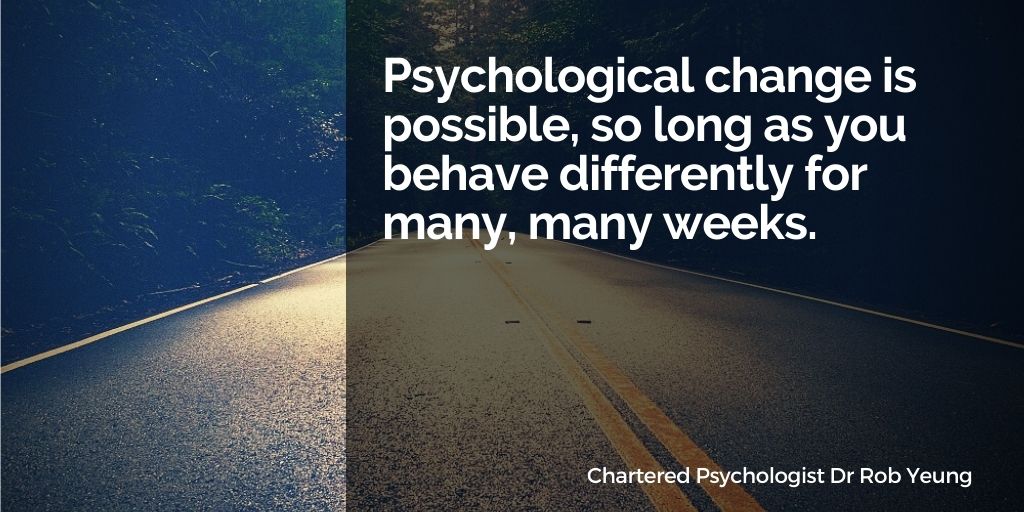How to change your personality

We talk about other people’s personalities in terms of the adjectives we use to describe them. So, one person might be “talkative but rude” while another person may be “quiet and inquisitive”. But in psychological terms, personality is broadly defined as a set of enduring traits and processes within the individual that influence that person’s interactions with the world.
Most psychologists agree that there are at least five (but possibly more) dimensions of personality. These include: extraversion, emotional stability, openness to experience, agreeableness, and conscientiousness. Other dimensions of personality include honesty and ambition.
Surveys show that a lot of people want to change their personalities. For example, some people wish they could be more conscientious – more organised, tidy, and careful. Others want to become more extraverted – more talkative, outgoing, and able to speak up for themselves.
Several hundred studies have been conducted on the topic of personality change. Using a statistical technique called meta-analysis, a team of investigators led by academic Brent Roberts reviewed these many individual studies and confirmed that personality change was indeed possible. For example, people who were worrisome and low on emotional stability were often able to become less emotionally volatile and more centred.
Setting the right goals
Recent research led by Nathan Hudson at Southern Methodist University found that people were able to change their personalities in small but measurable ways in only 16 weeks. So, it’s important to recognise that personality change isn’t something that happens overnight or only in a few weeks. It will likely take months of effort.
Hudson’s team also found that the largest personality changes came when people wanted to change either their level of extraversion (i.e. the extent to which they enjoy and find it easy to approach and engage with others) or emotional stability (i.e. the extent to which they are able to stay calm and confident in the face of challenges and difficulties). People achieved the smallest amount of change for the personality dimensions of agreeableness (i.e. the extent to which they seek harmony and agreement in their relationships with others) and openness to experience (i.e. the extent to which people seek out a wide variety of intellectual and cultural pursuits). So, it may be worth reminding yourself that some personality traits may be easier to change than others.
Taking action
How did people manage to change their actual personalities? First of all, they set goals and then made a series of commitments to themselves in terms of actions they would take.
For example, a person who wanted to become more extraverted would decide on various actions that involved talking to others or taking charge in group situations. To start with, someone very low on extraversion might set themselves the task of just speaking to customer service employees in shops or supermarkets they went to. Someone who was moderately extraverted (but who wanted to become even more extraverted) might set themselves the goal of volunteering to become the leader of a project at work, for instance.
Someone wanting to increase their level of openness to experience might decide to read a couple of news items about foreign countries. Another person who was already a bit higher on openness to experience might set themselves the challenge to find someone with a different point of view on an contentious topic and then to have a conversation with that person.
But not everybody who wants to change their personalities actually manages to do so. A separate study discovered that some people slid backwards – their personalities changed in the opposite direction. In these instances, researchers have discovered that change in the wrong direction typically happened when people wanted to change but did not take actual action to do so. In other words, these people might have had the intention to change, but they didn’t follow through by modifying their day-to-day behaviour and actually completing tasks and challenges.
It’s like understanding the theory of weight loss. But then not actually doing any physical exercise or cooking and eating differently. Understanding the theory of personality change but not doing anything about it actually tended to make things worse for some people.
Making personality change work for you
By all means have a go at changing your personality. But remember:
- Accept that personality change is something that will take months rather than just a few weeks or days. This isn’t a quick fix. This is a project that will require a bit of sustained effort on your part.
- Don’t just wish or hope that your personality will change. If you set goals but don’t actually change your behaviour, you might actually end up changing your personality in the wrong direction.
- Above all, commit to taking actions in the real world. For example, I’ve written tips for introverts who need to network and advice for introverted leaders. So go talk to new people. Or talk to people in a different way – perhaps by modifying how you speak or use your body language to demonstrate the kind of personality you’d like to show the world. Read books. Watch videos. Rehearse what you want to say in particular situations. Keep doing things and you give yourself the very best chance of changing your fundamental personality and becoming a better version of you.


Leave a Reply
You must be logged in to post a comment.